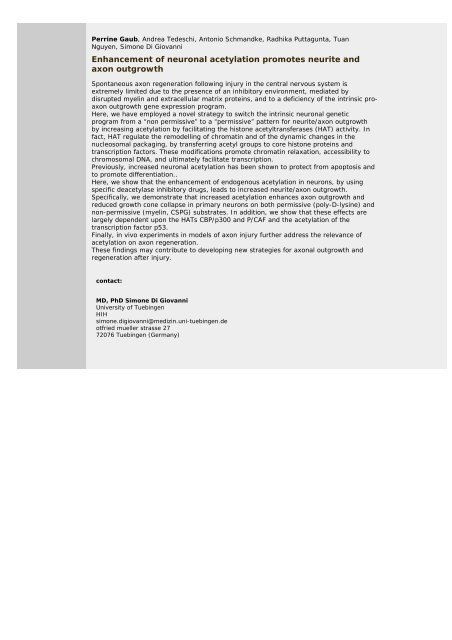Abstracts (poster) - Wissenschaft Online
Abstracts (poster) - Wissenschaft Online
Abstracts (poster) - Wissenschaft Online
Create successful ePaper yourself
Turn your PDF publications into a flip-book with our unique Google optimized e-Paper software.
Perrine Gaub, Andrea Tedeschi, Antonio Schmandke, Radhika Puttagunta, Tuan<br />
Nguyen, Simone Di Giovanni<br />
Enhancement of neuronal acetylation promotes neurite and<br />
axon outgrowth<br />
Spontaneous axon regeneration following injury in the central nervous system is<br />
extremely limited due to the presence of an inhibitory environment, mediated by<br />
disrupted myelin and extracellular matrix proteins, and to a deficiency of the intrinsic proaxon<br />
outgrowth gene expression program.<br />
Here, we have employed a novel strategy to switch the intrinsic neuronal genetic<br />
program from a “non permissive” to a “permissive” pattern for neurite/axon outgrowth<br />
by increasing acetylation by facilitating the histone acetyltransferases (HAT) activity. In<br />
fact, HAT regulate the remodelling of chromatin and of the dynamic changes in the<br />
nucleosomal packaging, by transferring acetyl groups to core histone proteins and<br />
transcription factors. These modifications promote chromatin relaxation, accessibility to<br />
chromosomal DNA, and ultimately facilitate transcription.<br />
Previously, increased neuronal acetylation has been shown to protect from apoptosis and<br />
to promote differentiation..<br />
Here, we show that the enhancement of endogenous acetylation in neurons, by using<br />
specific deacetylase inhibitory drugs, leads to increased neurite/axon outgrowth.<br />
Specifically, we demonstrate that increased acetylation enhances axon outgrowth and<br />
reduced growth cone collapse in primary neurons on both permissive (poly-D-lysine) and<br />
non-permissive (myelin, CSPG) substrates. In addition, we show that these effects are<br />
largely dependent upon the HATs CBP/p300 and P/CAF and the acetylation of the<br />
transcription factor p53.<br />
Finally, in vivo experiments in models of axon injury further address the relevance of<br />
acetylation on axon regeneration.<br />
These findings may contribute to developing new strategies for axonal outgrowth and<br />
regeneration after injury.<br />
contact:<br />
MD, PhD Simone Di Giovanni<br />
University of Tuebingen<br />
HIH<br />
simone.digiovanni@medizin.uni-tuebingen.de<br />
otfried mueller strasse 27<br />
72076 Tuebingen (Germany)

















